This House believes marriage between close family members should be discouraged
Monday March 19 2012
MOTION PASSED
by 81% to 19%
Transcript
Order of speeches
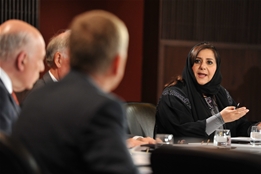
Introduction
TIM SEBASTIAN
Ladies and gentlemen, a very good evening and welcome to the latest in our series of Doha Debates, coming to you from the Gulf State of Qatar and sponsored by the Qatar Foundation. Around the world, hundreds of millions of people live in communities where close family members marry each other. They're often called ‘consanguineous marriages' - people joined by the ties of blood. Nowhere is this more common than here in the Arab world - and, incidentally, here in Qatar - where more than 50 percent of marriages are between close family members. So the effects of such unions are keenly felt in this region. Much has been written about the risk, increased risk of genetic disorders being passed on through marriages of this kind. But what do the experts make of it? Should such marriages continue to be sanctioned - or is this no place for the heavy hand of the State or its medical experts to weigh in and interfere? Our motion, as usual, takes a controversial stance: ‘This House believes that marriage between close family members should be discouraged.' We have two scientists on different sides of the argument and two other panel members who approach the issue from a social and religious standpoint. Speaking for the motion: Sarfraz Manzoor, cultural commentator and broadcaster. His topics include British Asian identity, faith schools and social cohesion as well as matrimonial websites among British Muslims. And with him: Ohad Birk, geneticist and head of the Genetics Institute at Soroka University Medical Center in Israel. He's set up a screening programme for severe genetic diseases which has helped reduce the rate of infant mortality in Bedouin communities. Speaking against the motion: Samar Fatany, writer, columnist and broadcaster on social issues on Saudi television. She has played an active part in social awareness campaigns, enhancing the role of women and promoting youth empowerment. Also against the motion: Alan Bittles, who comes to the table with more than thirty years experience studying the effects of consanguineous marriages. He is now Adjunct Professor at the Centre for Comparative Genomics at Murdoch University in Australia. Ladies and gentlemen, that's our panel. [Audience applause] So let me first ask Sarfraz Manzoor to speak for the motion, please.
Sarfraz Manzoor
Speaking for the motion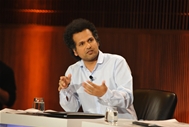
SARFRAZ MANZOOR
Thanks, Tim. I believe cousin marriages should be discouraged because I think they're unhealthy for the couple and unwise for society. Unhealthy for the couple because of the health risks. In the UK, where I'm from, 50 percent of British Pakistani marriages are to their first cousin. And British Pakistanis are 13 times more likely to produce children with genetic disorders than the average. British Pakistanis account for only three percent of the British population, but they're responsible for 33 percent of all the children born with genetic defects. I think these are pretty scary numbers. So why do we still put up with it? I reckon it's because we, most of us, are too scared to speak out. And it's time to stand up and say that cultural tradition isn't a good enough reason to be sticking with this practice. I mean, let's face facts. This is not a situation where two people fall in love and they just happen to be cousins; these marriages are arranged by families who want to keep wealth and property in the family or it's a way of getting people into Britain, as in the country of my story. They've got nothing to do with people getting married and everything to do with pleasing others. It's the same situation with Qatar: you've got all this money, but you've also got the greatest prevalence of obesity, diabetes and genetic disorders in the world, and cousin marriages is a reason. I think societies are healthier when all communities mix and integrate. The more families marry within each other, the less chance of creating an integrated society. So to conclude: I am against cousin marriages because I am for human rights, for individual freedom and for a socially integrated society. Thank you.
TIM SEBASTIAN
Sarfraz Manzoor, thank you very much indeed. In many communities around the world you'd discourage close family marriage: what's the alternative? That is the only alternative available to some people.
SARFRAZ MANZOOR
I don't believe that that's true. Why should it only be the person next door within your family that's the alternative?
TIM SEBASTIAN
Well, because you don't get to meet other people.
SARFRAZ MANZOOR
Well, that's about trying to create a society where actually you are allowed to meet people, where you are allowed to meet people.
TIM SEBASTIAN
Or acknowledging the society that you live in and the safety-net which the wider family provides for you?
SARFRAZ MANZOOR
I'm not sure. The safety-net could be a bit of a prison, actually. Because at the end, if you haven't got the freedom to be able to think about yourself and your own desires and your own happinesses, the safety-net may help ‘the community'; it doesn't necessarily help the individuals getting married.
TIM SEBASTIAN
Isn't that a comfortable Western view? Try putting yourself in the position of people here, for instance..
SARFRAZ MANZOOR
I'm not particularly - I don't originate from..
TIM SEBASTIAN
.. or elsewhere in the Gulf, or in some of the countries where consanguineous marriage is increasing?
SARFRAZ MANZOOR
No, my heritage isn't particularly from the West. So I think those are universal principles. I don't think the West has a monopoly on freedom or human rights or the individual liberty.
TIM SEBASTIAN
If the mosque tells people not to pay attention to the science, they're not going to listen to doctors, are they?
SARFRAZ MANZOOR
No, they're not. And I don't think that the word of science is necessarily going to help. But what I do think is that you can create a debate within communities. And partly through education and also through supporting people who choose and have the courage to break out of some of these constraints, I think that's the way to do it. I don't think legislation or science necessarily is going to be the answer.
TIM SEBASTIAN
But some people would see their ties within their family and the support which families give them as almost as important as their health and, in some cases, much more important than their health.
SARFRAZ MANZOOR
Some people would think that...
TIM SEBASTIAN
It's only in the West that health is seen as everything, the be all and end all of your existence.
SARFRAZ MANZOOR
Yes, as I pointed out, I'm not actually using the health argument particularly; I think it's about social cohesion. In Britain, for example, you've got communities who, if they're marrying within each other, they're not facing the wider society and therefore they're having a danger of being more retrenched and basically having effective segregation.
TIM SEBASTIAN
The World Health Organisation says: "Don't discourage this." You're going to put yourself against the World Health Organisation?
SARFRAZ MANZOOR
I think there's a lot of political insensitivity about this sort of stuff, and I think actually...
TIM SEBASTIAN
This is sensitivity.
SARFRAZ MANZOOR
Political sensitivity, yes, of course.
TIM SEBASTIAN
Yes.
SARFRAZ MANZOOR
And the reason for that, it's not...
TIM SEBASTIAN
Yes, being sensitive to other people's demands, other people's politics, other people's traditions.
SARFRAZ MANZOOR
Well, you can say that, but you could say that ‘sensitive' could be another word for saying ‘scared'. I would say that they might be being scared. Because there's a danger that actually something which is actually commonsense is loaded with political baggage. So actually it's completely commonsense that there are more people in the world you can marry than your cousin, but maybe the WHO can't say that because of the number of members who are part of it.
TIM SEBASTIAN
Right, okay. All right, Sarfraz Manzoor, thank you very much indeed. Now could I ask, please, Samar Fatany to speak against the motion.
Samar Fatany
Speaking against the motion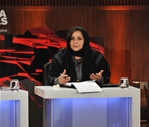
SAMAR FATANY
Well, first of all, I'd like to differentiate between the Muslim community in Britain and the Arab world - it's a different set-up here. We are a larger population; you have a smaller one. And the fact that you mix marriages between the traditional and the more westernised is also an issue. In our part of the world, you cannot discourage it, simply because there are religious and cultural reasons. So in principle you cannot discourage a Muslim from wanting to do something that is permitted by God. Culturally, the lifestyle here, there's a lot of respect for the family. Families kind of feel comfortable if their daughters marry within the family, rather than marry a stranger with no background. They're not sure whether she's going to be happy, safe and whatnot. At the same time, the segregated lifestyle doesn't allow for the mixing of sexes except within the family environment. So you usually have, you know, the cousins falling in love, and parents will not stand in the way of love, and feeling comfortable that their daughter's marrying within the family. Also, the only thing that we can do to discourage it - and I think in Qatar, and Saudi Arabia's the same - it is compulsory to have a medical blood-test before getting married, to make sure. The only thing that would discourage such a marriage is if there is a chronic hereditary disease within the family. And when that happens, usually within the educated middle class, so if they're aware of the fact, I don't think the couple would want to go through with the marriage. You know, there are many reasons and at the same time, you know, people kind of feel that it is good for the society; it helps a family have stronger ties. We're very proud of the fact that we have the extended family lifestyle - it is something that we would not want to lose. So there's so many reasons. And the fact...
TIM SEBASTIAN
Would you come to a close, please.
SAMAR FATANY
Sure. The fact that maybe sometimes in other parts of the world they feel that the girls are being forced into this marriage - it's an arranged marriage and she doesn't want to do it; it's the parents who make her want to do it - but it's not the case.
TIM SEBASTIAN
Okay. Samar Fatany, thank you very much indeed. You seem to suggest that medical testing is sufficient. I want to draw your attention to what specialists, geneticists at the Shafallah Special Needs Centre here in Qatar said. They said: "There's no counselling to help people make decisions; and even if the results show one or both of the parents to be a carrier, the attitude is usually: ‘Well, carry on regardless. Everything will be okay, inshallah.' Is that the attitude that you're promoting?
SAMAR FATANY
I'm not promoting it, not at all. As I said, I mean, with education and people are health-conscious today, I don't think that educated couples...
TIM SEBASTIAN
But it's not working, is it? I mean, it's not working. Because people are carrying on regardless when they get the information.
SAMAR FATANY
I don't think this is the case with people who are educated and realise the consequences of that.
TIM SEBASTIAN
But this is the view from pretty well-established, pretty respected geneticists here in Qatar at the Special Needs Centre, which is via the Special Needs Centre.
SAMAR FATANY
I still have my doubts.
TIM SEBASTIAN
Your argument also that you cannot discourage something which is permitted by religion: there is a body of opinion in Islam that doesn't agree with you at all. There is a quote from the Prophet Muhammed that says: "Marry those who are unrelated to you, so that your children do not become weak."
SAMAR FATAN
Exactly. No..
TIM SEBASTIAN
We checked this with an Islamic scholar. He says this is a hadith, this is a saying of the Prophet. And if there is scientific fact to support it, then that makes it stronger and it should be followed.
SAMAR FATANY
But I did say the only thing that would discourage such a marriage is there is an absolute fact that there is a hereditary disease within that family. Most families who have a mental disease or maybe thalassemia, or that sort of disease that is chronic and it's hereditary, are always discouraged from going into this marriage. But not when there is no absolute proof that there is hereditary disease.
TIM SEBASTIAN
So there is some discouragement which is possible, some official discouragement?
SAMAR FATANY
Where there is hereditary. Yes.
TIM SEBASTIAN
When is it acceptable to be discouraged by a professional? I mean, we're discouraged from doing lots of things in life - by our teachers, by our family. Where do you draw the line here?
SAMAR FATANY
When medical tests prove that there is a hereditary disease and your offspring will have that kind of problem, abnormality.
TIM SEBASTIAN
All right. Samar Fatany, thank you very much indeed. Now could I please ask Ohad Birk to speak for the motion.
Ohad Birk
Speaking for the motion
OHAD BIRK
Good evening. I'll go back to basic genetics. So every human being has thousands of genes. For most genes we have two copies: one from our father, one from our mother. We all have mutations in some of our genes. However, we're lucky that many genetic diseases occur only when one gets both mutated copies. Now, if I have a bad copy of a gene and I marry outside the family, the chances that my wife brings in the same bad copy of the same gene are very small. However, if I marry my first cousin, the chances that she inherited the same bad copy from our common grandparent are much higher. Statistics show that worldwide the chances of having a child with a severe birth defect are around three percent. In first-cousin marriages, it goes up to six to seven percent. And in fact, if marriages in the family have been going on for generations, it goes up to 10 percent and more. Over the past decade I've been serving our Bedouin community of some 200,000 people, and in this community 60 percent marry their first or second cousins. Accordingly the incidence of severe birth defects is four times higher than in other communities. We arranged a very extensive programme of both research followed by genetic testing, and it was very successful - but only to a limit. At the end, it's human beings. Two days ago a couple came into my office with their two bright, beautiful girls, both born with no eyes, not eyeballs. This couple is devastated. Last week I visited the home of a family - he's a high-school teacher, and three of his kids, aged 23, 20 and 18 are in diapers, severely mentally retarded, don't recognise their parents. These families send a very clear message: marry within your community, marry even within your remote family, but do not marry your first cousin.
TIM SEBASTIAN
Ohad Birk, thank you very much indeed. Do you want a nanny state where the state interferes in all aspects of your life, takes away one more aspect of your freedom to live as you want, your freedom for manoeuvre, your freedom to make decisions about your own fate?
OHAD BIRK
In genetics, in clinical genetics, it's non-directive genetic counselling that's the basis: we allow and direct everyone to make their choices. People should know, but then they should make their own choices.
TIM SEBASTIAN
That's not discouraging. You are advocating ‘discourage'. Who's to do the discouraging?
OHAD BIRK
It's up to the community.
TIM SEBASTIAN
But how strong should this be, this discouragement?
OHAD BIRK
Not legal - it won't work in a legal way. It's people that need to make their decision. They either take a huge risk or they don't take a huge risk. You know, you can marry your third or fourth cousin..
TIM SEBASTIAN
"Life is full of risks," they will tell you.
OHAD BIRK
Yes, but if you...
TIM SEBASTIAN
"God will decide." That's what many people say.
OHAD BIRK
Look, I know hundreds of families, they are.. When you see people that have a very sick child, when it goes down to the next pregnancy people have abortions, though it's horrible. In Islam, early on in pregnancy it's allowed, but it's a very hard choice. And you see mothers doing that because it's such huge suffering. So why not marry your third..
TIM SEBASTIAN
But the human race continues to survive when many people have been going on with this practice for centuries.
OHAD BIRK
Right, but you're a family and you marry your third or fourth cousin, and why go through that? It's just huge suffering. You know, it's not my call, and it's not anyone's call.
TIM SEBASTIAN
Why be interfered with by doctors? Why have somebody breathing down your neck and trying to upset the traditions that have underpinned your society for centuries?
OHAD BIRK
No need for interference by doctors. Doctors should supply the information. The choices should be made by the people, by the people...
TIM SEBASTIAN
And who's to interpret the information for the people?
OHAD BIRK
The scientific information by scientists and by physicians. The implications by the family. And each family should decide whether they want to take the risk or not, but they should know that it's a huge risk.
TIM SEBASTIAN
Okay, Ohad Birk, thank you very much indeed. Alan Bittles, could I ask you to speak against the motion, please.
Alan Bittles
Speaking against the motion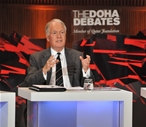
ALAN BITTLES
Yes. And before I say anything else, I'm intrigued by the fact that the two colleagues on the right-hand side seem to differ in the risk rates. We heard Sarfraz talking about 13 times higher risk rate of genetic disease, 33 percent of all cases in Britain of genetic disease were in the three percent of people who are Pakistani; whereas Ohad is saying it's six to seven percent: well, that's a big difference. And I think part of the problem is, although you eschewed the role of science and said you weren't taking a scientific stance, you were in quoting these statistics, which I think are totally spurious and I don't know where you got them from. I will give you some statistics now. They are based on five million births, on 75 studies from around the world. The risk of excess stillbirths in first-cousin offspring is 0.5 per thousand; infant deaths 12.5 per thousand; deaths from late pregnancy through to 10-12 years, that would be 34 per thousand. We're not talking 33 percent. These are ludicrous figures. So you do yourself no service, and you do the case you're trying to make no service, by quoting figures of that nature. So really what I want to know is - and Ohad has said it's okay to marry within the clan, within the community, because, of course, if you don't marry your first cousin you're going to marry within the clan or you're going to marry within the community. And the degree to which you will reduce the risk of genetic disease is actually quite limited. And if we are going to take this idea that we will ‘discourage' (in parenthesis) people from marrying close kin, who is actually going to monitor this? Who is going to run it? Under what situations will it be applied? Will it be mandatory, will it be voluntary? If someone opts out and says, "No, I don't want any part of this," are we going to take some stance against that? And we really need to know this thing because, as a medical geneticist of thirty/forty years' standing, I'm well aware of the difficulties that have been in the past as a result of misuse of genetics. The early part of the twentieth century, literally hundreds of thousands of people were murdered or sterilised on eugenic grounds.
TIM SEBASTIAN
Could you come to a close, please.
ALAN BITTLES
I will close at that point in time. I think we've got to be very careful. What may appear to be a reasonable stance - and I'm sure in the hands of reasonable people is a reasonable stance - can turn out to be a monster that you've created for all our problems.
TIM SEBASTIAN
Okay. Alan Bittles, thank you very much indeed. You're unusually reticent for a doctor - most of them are pretty forthright in telling us what we can do - what we can eat, what we can't eat, what we should eat, what we shouldn't eat; what kind of sex we should practice, this sort of thing. You're unusually reticent. Why over this?
ALAN BITTLES
I'm a reticent sort of guy, you know. I'm not out to say to people, "You must do this" or "you must do that."
TIM SEBASTIAN
Where the quality of life of children is concerned, you want to suddenly step back...
ALAN BITTLES
Certainly not.
TIM SEBASTIAN
... from the role that doctors are increasingly assuming, which is to tell us how we should live every moment of our lives.
ALAN BITTLES
And you're accusing me of this: on one hand you're saying "Why are you not doing it"..
TIM SEBASTIAN
I'm wondering why you're stepping back here.
ALAN BITTLES
Because when I started this work, I started from a background. My background is in Northern Ireland, and I thought the idea of going out with one's cousin or marrying a cousin was absolutely ludicrous, this was scandalous, and would inevitably be harmful. The work that I've been doing over the last 30/40years has convinced me that the problems that accrue from consanguineous marriage, by comparison with the actual social benefits - particularly, it must be stressed, the social benefits to females...
TIM SEBASTIAN
But you don't dispute the risks of deformity that increase with first-cousin marriage, do you?
ALAN BITTLES
Oh, certainly not.
TIM SEBASTIAN
And "in terms of birth defects" - this is something you said in 2008 - "in terms of birth defects, the risks rise from about two percent in the general population to four percent when parents are closely related." You'd stand by that?
ALAN BITTLES
I would stand by that, absolutely.
TIM SEBASTIAN
So this is an increased risk.
ALAN BITTLES
An increased risk, put in context...
TIM SEBASTIAN
And in general people should be encouraged not to take increased risk. We're asking for a red traffic light at the junction.
ALAN BITTLES
Absolutely. You're the red traffic light guy; I'm the amber guy. You know, I might give a warning signal going up, but you've got to put that extra two to four percent in the context of four children in the family.
TIM SEBASTIAN
Warning isn't discouragement? Warning isn't discouragement?
ALAN BITTLES
How do you explain to someone: "You're going to have four children. You have an increased risk of two to four percent." What does two to four percent mean with four children?
TIM SEBASTIAN
It's double. It's double. From two to four that's double the risk.
ALAN BITTLES
So you're going from what - you're going to have all four children effected as opposed to two children?
TIM SEBASTIAN
You're going to minimise risk wherever you can. Alan Bittles, thank you very much indeed. We are now going to throw it open to the questions from the floor. Our motion is: ‘This House believes that marriage between close family members should be discouraged.' Going to take your questions. Gentleman up there, straight ahead of me.
Audience questions
AUDIENCE (M)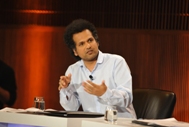
I'm Egyptian. Mr. Manzoor, for the motion: you concluded your point of view according to the situation which is in Pakistani families moving to the UK. Why do you need to generalise that for the whole world? Thank you.
SARFRAZ MANZOOR
You would say ‘generalise' - I was saying I was talking to an area that I know about. I'm not going to start talking and lecturing the people of another country when my expertise or my area is in one country. So what you say, ‘generalise', I say I stick to what I know. But from what I've read, Qatar seems to have quite a big problem with genetic defects amongst its population. And from what I've read, part of that is because of cousin marriages. So the two things don't seem to be completely two spuriously random facts. I'm wondering whether they might possibly be related.
TIM SEBASTIAN (to questioner)
Do you want to - are you satisfied with that answer?
AUDIENCE (M)
Not yet
TIM SEBASTIAN (to questioner)
Why not?
AUDIENCE (M)
Because actually again you related only to Pakistani families. Here, like I grew up..
SARFRAZ MANZOOR
Not in that last answer, I didn't.
AUDIENCE (M)
I'm going to continue. Thank you. I grew up here in Qatar, so I'm looking for a girl which is my cousin, then I'm not going to get married to her because of your point of view of Pakistani family.
SARFRAZ MANZOOR
So are you putting out an - is this a Wanted ad for somebody else or something? I don't quite understand your point. Are you saying that you want to marry your cousin and you don't want me to object to that?
AUDIENCE (M)
Yes, what's your point of view on this?
SARFRAZ MANZOOR
Do you love her? [Audience laughter]
AUDIENCE (M)
Yes, I do.
SARFRAZ MANZOOR
Good luck to you. But I mean...
AUDIENCE (M)
Thank you. Done.
SARFRAZ MANZOOR
You know, personally, if you want to marry your cousin, that's fine, but I personally wouldn't want my daughter to marry her cousin.
TIM SEBASTIAN (to questioner)
I want to ask you before you sit down - well, you have sat down. Could you get up again? Are you going through genetic testing, premarital genetic testing?
AUDIENCE (M)
Nope, I'm not going.
TIM SEBASTIAN
Why not?
AUDIENCE (M)
Because actually it could happen - it couldn't happen, right?
TIM SEBASTIAN
Even Alan Bittles, you'd recommend premarital genetic testing, wouldn't you?
ALAN BITTLES
Absolutely.
SARFRAZ MANZOOR
Can I just ask you a quick question?
AUDIENCE (M)
Go ahead.
SARFRAZ MANZOOR
How old are you?
AUDIENCE (M)
32.
SARFRAZ MANZOOR
In your 32 years, have you ever fallen in love with anyone who wasn't directly a family member?
AUDIENCE (M)
Yes.
SARFRAZ MANZOOR
So it is possible to possibly marry somebody who's not your cousin, then?
AUDIENCE (M)
Yes.
SARFRAZ MANZOOR
Well, that's good. [Audience laughter, applause]
TIM SEBASTIAN
Could I just, before we take the next question, ask how many people are actually married to their first cousins, and how many intend to marry their first cousins. If you would put up your hands, please, it would be very instructive. There's one gentleman there. Is there really nobody else in this hall who is..? Ah, up there. Okay, there are a couple, but a very small number. Okay, we'll take the next question. Gentleman in the front row.
AUDIENCE (M)
I'm from the Sultanate of Oman. My question is for this side, who is for the motion. How can we be 100 percent guaranteed that if we are doing the test, that no results will happen in the future? And if we don't do the test and get married to a lady from outside my family, how can I be also 100 percent guaranteed that I will not get an effect from that?
TIM SEBASTIAN
Ohad Birk.
OHAD BIRK
Okay. So genetic testing is very important, very crucial, but has its limitations, especially in first-cousin marriages. First-cousin marriages, you can have two types of diseases: diseases that are common in that community and these will be tested for if you have a good screening programme. However, there are also genetic diseases that are unique to your family, and no way that a screening programme will find them. So if people think, "Oh, I did the testing and I'm fine" - well, do the testing: it's important, but it will find only part of the diseases. Now, if you marry your third or fourth cousin, what you will have in common are diseases that are much more common and that will be screened for by the genetic screening. So if you marry your third or fourth cousin, first of all you dramatically reduce the risk of a genetic disease..
TIM SEBASTIAN
But nothing's foolproof?
OHAD BIRK
No. And genetic testing is much more effective then.
TIM SEBASTIAN
Okay, Alan Bittles, I want to bring you in on this.
ALAN BITTLES
I would agree absolutely with what Ohad is saying, but of course what he has failed to say is that the risks which accrue from first-cousin marriage really concentrate on otherwise very rare diseases. When diseases are common in the gene pool, as with sickle-cell disease or thalassemia, which you may be tested for in Oman, then the added risk of being a first-cousin marriage to that of the general population is actually quite low. So these rare diseases really only affect first-cousin marriages.
OHAD BIRK
I have to go in here. Look, I have been dealing with Arab Bedouin genetics for a decade on a daily clinical basis, and the numbers in textbooks talk about six percent. In real life it's much higher than that, because it's not first-cousin marriages that you have in the statistics; it's been going on in that family for generations. And what you see is specific diseases for families that have much higher percentages than textbooks. And it's not, "I marry for the first time my first cousin" - it's very different. It's been going on for years.
TIM SEBASTIAN
Okay, let's come back to the questioner. Are you impressed by what you've heard?
AUDIENCE (M)
Well, yes, but I still have another point regarding this one. I mean, those genetic problems are not created because of cousin marriage. Because if I am Chinese and I will get married to an Indian lady, for example, I might get those the same?
OHAD BIRK
No, much lower risk. Because she's a carrier for one disease, you are a carrier for another disease, and the children would have not this disease and not this disease. But if you're..
ALAN BITTLES
I think what the gentleman says: you might get it - and of course he is correct in so saying.
OHAD BIRK
"You might get it." Yes, but the percentages are far lower. I mean, this is inbreeding for generations; it's not a first-time cousin marrying a cousin.
TIM SEBASTIAN
Okay. I'm going to take a question from the gentleman in the second row there.
AUDIENCE (M)
Thank you. I'm from Afghanistan, and I have a question for Miss Samar. Discouraging family marriages also suggests fundamental social reforms as Manzoor suggested. Don't you believe that states in this part of the world are also afraid of bringing such fundamental reforms, such as mixing work areas or education system, in order to promote diverse marriages? Don't you believe the states are afraid of some radical movements or some Islamic institutions against those reforms?
TIM SEBASTIAN (to questioner)
You're saying it's time for a change, are you?
AUDIENCE (M)
I'm just suggesting that - I'm saying that don't you think the governments are not discouraging family marriages because they're afraid of those reforms, that probably they will bring some backlash?
TIM SEBASTIAN
Samar Fatany.
SAMAR FATANY
Well, I don't think so. I think, as I said, it's the lifestyle, it's the culture. People are comfortable about that. I don't think it has to do with the state or with medical tests or with. I think it's important - I agree with what the specialists say: we need to have awareness, we need to tell them the risks that they're taking; we need to have medical check-ups; there should be a major campaign on radio/television to show what the risks are that they're going to endure. But at the same time it's the extended family lifestyle: people feel comfortable to have the extended family, to marry within the family.
TIM SEBASTIAN
How comfortable are they, for instance, in Qatar, where the divorce rate is almost 40 percent among couples that are in consanguineous relationships? How comfortable are they with those figures?
SAMAR FATANY
Then there's something with the social fabric. It has nothing...
TIM SEBASTIAN
Nothing to do with consanguineous marriages?
SAMAR FATANY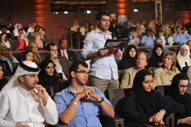
I don't think so. You know, it's how you feel comfortable and who you love, who you want to marry, the family surrounding you that you're comfortable with.
SARFRAZ MANZOOR
I mean, it sounds like a sort of radical idea, but don't people partly get married to get away from their families? (Audience laughter]
SAMAR FATANY
Really? [laughs] Well, I tell you, most of the girls, especially in this part of the world - I mean, my parents were cousins and my brother's married to his cousin - some families feel kind of offended if like a graduate in the family just came home and there are so many pretty girls in the family and he decides to marry outside the family. It's frowned upon. Most of the girls would want to feel comfortable to be married, if there are nice boys in the family, she would rather do that rather than marry someone who's a stranger.
SARFRAZ MANZOOR
It just strikes me that your whole argument's sort of..
TIM SEBASTIAN
We might ask some of the ladies in the audience whether they agree with you on that one. Any of you like to comment, some of the ladies, perhaps in the front row? Have you got a comment on this? Okay, all right, we'll hear from you [points to audience member], and then we'll come back to the questioner. We'll get a microphone here, please.
AUDIENCE (F)
I'm a Canadian student at the American University of Paris, and we talked a little bit about women's rights. But isn't this really an exchange of women, and isn't this a way of owning their reproductive rights?
SAMAR FATANY
No, she's in love with her cousin and she wants to get married to him. Where is that against human rights? She's not forced into that marriage; she is willingly getting into the marriage.
AUDIENCE (F)
Can you guarantee that she's not being pressured into this?
SAMAR FATANY
Then it's another story. You know, we're not discussing - that's another issue. We're talking about people who willingly and, you know, lovingly want to be part of the family.
TIM SEBASTIAN
And in large numbers here in Qatar, for instance, are getting out of those marriages, as well, that they so lovingly went into. [Audience applause]
SAMAR FATANY
Well, I mean, it happens. I mean, the divorce rate is high all over the world. I don't think it has to do with that.
TIM SEBASTIAN
I'm going back to the questioner here.
AUDIENCE (M)
Well, she just said that it's - I think it's very simplistic to bring the love issues, because I believe that the state does play a very important role in marriage contracts, especially in this region. If you're saying that the state is not involved, then why isn't the state allowing cross-cultural marriages, or maybe expats' marriages with the locals? So don't you believe that this is actually explained then..?
SAMAR FATANY
The state never - there's no ban on marrying outside.
AUDIENCE (M)
Yes.
SAMAR FATANY
There is no ban. The only thing is you need to have permission - and I guess this is for security reasons; it has nothing to do with any banning.
TIM SEBASTIAN
Okay. We'll take a question. Gentleman in the third row there.
AUDIENCE (M)
I'm a consultant psychiatrist, Syrian - I would say Irish from Syrian origin, since I lived in Northern Ireland for 20 years; just back, moved to Qatar. So welcome, Professor Alan.
TIM SEBASTIAN
So you speak the language?
AUDIENCE (M)
Sort of. [Audience laughter] If he speaks Gaelic, I will speak Gaelic, Conas ta tu? I would say. But anyway, as a psychiatrist I have a few families with cousin marriages with severe learning disabilities. Actually one family live in Derry with four children - two boys and two girls: one boy, one girl - now they are in their thirties - with severe learning disability. The Islamic - although I am for the motion, I'm against bringing the forced marriage or the arranged marriage into the debate, because people might throw the motion because they don't want the arranged marriage. There is an organisation in Kuwait, the Islamic Organisation for Medical Sciences. They usually hold seminars where they bring 25 scholars, Islamic scholars, and 25 medical/ paramedical. They had a seminar a couple of years ago - I had the pleasure of attending. They discussed this issue. They stopped short of forbidding mixed marriages, but they definitely discourage it from their resolutions. Thank you.
TIM SEBASTIAN
Can I ask you how you would discourage - what form would this discouragement take?
AUDIENCE (M)
The fact, Tim, when you asked the audience how many of them have cousin marriages - well, I think one or two, did you say? So I would respect..
TIM SEBASTIAN
Four or five, yes.
AUDIENCE (M)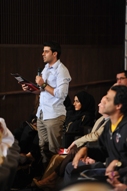
Yes, I would respect the public. We are assuming that the people don't listen to science and they don't follow - they do listen to science. I have three boys at the age of marriages, who are looking for wives; definitely we are not thinking about cousins. Definitely. And the fact that many people avoid marriage from their cousins. The fact: it means that they do listen to science and they do listen to religion, and they are not in conflict.
TIM SEBASTIAN
Alan Bittles, do you want to comment on that?
ALAN BITTLES
I think it's a very fair comment. Of course, when you say they listen to science and they listen to the figures, it depends which figures they're listening to. If they're listening to the type of figures that Sarfraz was going - which presumably he read somewhere rather than actually derived himself - then that would be genuinely scary. Whereas what I'm saying is that the situation, if you take it in context and you take the situation, particularly in countries like the Yemen, where there is a very high infant mortality rate of 50/60 per thousand, an extra 12.5 per thousand is a burden but a burden that is well within the context of the health of that community.
TIM SEBASTIAN
Sarfraz Manzoor.
SARFRAZ MANZOOR
Yes, one or two points. One is I think you're doing a heroic job defending a position which I'm not so sure you actually believe. And the second thing was that the statistics I was quoting are from a Channel Four documentary, When Cousins Marry, and also from Prospect Magazine. Neither of them were particularly spurious. And the reason that the figures were higher is because in British Pakistani culture it's not just first generation; it's the second generation or third generation, and therefore there is a cumulative number of generations of first-cousin marriages. Therefore that's why the statistics are higher.
ALAN BITTLES
Tim, can I say..?
SAMAR FATANY
Yes, I agree with that.
TIM SEBASTIAN
Let me just come back to the questioner. Yes.
AUDIENCE (M)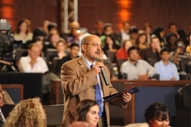
I'm glad to see that no one is forcing people to avoid cousin marriages. But we are discouraging, and I believe in informed consent. People are told what is the story, and then it's their choice. Thank you.
ALAN BITTLES
Can I...?
TIM SEBASTIAN
Yes, just comment briefly, and then I must move on - there's other questions out there.
ALAN BITTLES
Just to answer your question: you want discouragement - who's going to do the discouraging? What limits do you put on discouraging? When does discouragement become almost an absolute ban?
AUDIENCE (M)
I think good scientists like yourself, when you inform the people that by mixed marriages they double the risk, that's it.
TIM SEBASTIAN
When you've been converted to the opposite point of view, you can go and discourage people over there.
ALAN BITTLES
Please don't hold your breath for too long.
TIM SEBASTIAN
Until then, we'll wait for that to be done this side.
OHAD BIRK
The six or seven percent are textbook, and it's throughout the Arab world, and it's in Pakistanis, and in fact the 10 percent and more when the inbreeding goes on for generations is proven throughout many studies throughout the world. So these are real numbers.
TIM SEBASTIAN
Okay. Lady up there, with your hand up. Thank you.
AUDIENCE (F)
Hello, everyone. I'm from Sudan. I would say I'm living evidence that cousins' marriage doesn't work. I come from a family with a history of first-cousin marriage. My parents are first cousins, and my aunt also got married to her cousin. She had two children. Both of them died early in their life, and they had very dangerous hereditary diseases and they actually suffered in their lives. And my question is to the side against. What I'm saying is that I'm now afraid of the time, like when I get into my forties or my fifties, I'll get diabetes because everyone in my family has diabetes. And other than that, I think it's not about like a girl looking at her cousin and thinking what good qualities he has. You as a female have many responsibilities, and you have to think about your kids. So I would think that's more appropriate to think of. And cousins' marriages also have many problems from a social side. And people get divorced because they can have more children that have problems like health problems and even like mental problems. So I don't think there is something that could be good coming out of it. Thank you.
SAMAR FATANY
But I think I..
TIM SEBASTIAN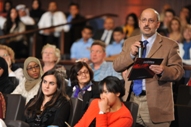
Samar Fatany, don't you have a responsibility, listening to that story, to take a stand against first-cousin marriage when you see the results?
SAMAR FATANY
If I.. sure. If I was a member of a family that had a hereditary disease, I would certainly not encourage my children or any member of the family to be married. But we're talking about healthy families. We're talking about families who do not have a hereditary disease like diabetes or sickle-cell, thalassemia or whatever, mental disease. A normal family with no hereditary disease. If I knew that in my family I had a hereditary disease like heart disease, whatever, I would definitely discourage it. But I would not apply it collectively.
OHAD BIRK
I see it daily, you know. Very often you often you don't see it, you don't know it, and you are the first one that it shows up.
SAMAR FATANY
Well, it could happen to you if you're a normal person.
OHAD BIRK
And then next year in two or three of your cousins, and in this direction suddenly - whoops, it shows up. And we see it again and again. And people come in with three or four diseases in the same family. I see it daily.
SAMAR FATANY
Are you trying to tell me that only the families who marry within each other are the only ones who get any kind of disease? I mean, diseases are all over the world. Why should it be that...?
TIM SEBASTIAN
Can you let him answer your point.
OHAD BIRK
No, but the incidence is much higher, and we see it, and trust me, it's.. When I'm here, I'm not here - it's not me; it's families sending me here. And people are promising that their kids will not marry their first cousins. And you say it's statistics: it's not statistics; it's real human beings. And if you fall in these statistics, your life is destroyed - the entire family, not just this child.
SAMAR FATANY
If I had the choice and I knew a person who wanted to marry me, and I knew that in his family he has a mental problem, the family has mental problems, I would not get into that. He is not a cousin, but I still would not want to do it. So it has nothing to do with cousins.
TIM SEBASTIAN
Okay. I'm going to move on. The lady with the hijab. Yes, you.
AUDIENCE (F)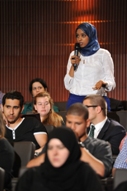
I'm from Tunisia. What I'm saying is that the most important thing - family is the most important unit in the society. And some of the families are not well-informed about the diseases. However, you said that marrying within the family ensures having safe and happy marriages. How can you ensure that? I mean, if not marrying within the family would not be happy and safe?
TIM SEBASTIAN
Samar Fatany, do you want to take that?
SAMAR FATANY
Sure. I was referring to families being comfortable with people in the family because they have a background about that family, that at least there will be elders in the family; if there's any problem, they will intervene. Definitely, if there's an uncle or a grandfather, would not allow for the husband to abuse or to continue in being abusive or not taking care of the member of the family. So it's kind of you're not marrying only one - you're marrying into a whole family. It's the same case when you find you know a family, even if you're not cousins, but you know that family, at least - this is the way it is in our culture. No one would want to marry into a family that you do not know. There's always people going asking around, "What is the background? Who are these people? Are they kind?" and whatever.
TIM SEBASTIAN
Sarfraz Manzoor, "Nobody wants to marry into a family they don't know"? People do it all the time, don't they?
SARFRAZ MANZOOR
Yes. I mean, to be honest, I don't see why it should be about marrying into families. It should be two people who are marrying, and then they happen to have families with them. And it strikes me that you can come upon a decent family, but the actual man or the woman could be a complete loser. So it's not really about..
SAMAR FATANY
Well, that's your luck - that would be your luck. But I mean, usually, that's the kind of culture, that we need to know who we're marrying into, whether they have..
SARFRAZ MANZOOR
But aren't you just talking from a position of complete defeatism, saying: "This is how it was. This is how it will be. What's the point in complaining about it?"
SAMAR FATANY
Well, it's worked. We have the beautiful extended family lifestyle, and we don't want to lose it. It's something that we're proud of.
TIM SEBASTIAN
Well, you kept saying this and ignoring the divorce figures, the rising divorce figures.
SAMAR FATANY
Well, but divorce is not because of genetic diseases. The divorce is because people, you know...
TIM SEBASTIAN
No, but it seems to dog people in consanguineous families.
ALAN BITTLES
Well, what is the divorce rate in non-consanguineous marriages in Qatar?
TIM SEBASTIAN
Apparently far less.
SAMAR FATANY
Or the whole world, for that matter.
TIM SEBASTIAN
Apparently far less.
ALAN BITTLES
When you say ‘apparently', have you got figures for it?
TIM SEBASTIAN
I haven't got figures for it, no, but it seems - apparently it's far less.
ALAN BITTLES
Because these figures that you're producing are actually...
TIM SEBASTIAN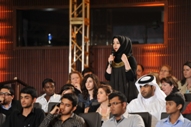
These are Government figures.
ALAN BITTLES
... are not at one with all other studies around the world. All other studies around the world have shown that divorce rates are actually lower in consanguineous marriages. So the Qatar figures are really pretty peculiar. And I'm actually surprised that they break down Government figures in terms of consanguineous versus non-consanguineous marriages. I'm not saying I don't believe what you're saying, but I'm saying I'm surprised. [Audience applause]
TIM SEBASTIAN
Well, you should be surprised, but in 2010 the Family Consultancy Center reported in Qatar that the divorce rate in the Qatari community was only slightly below 40 percent, making it one of the highest divorce rates in the world - in a country where over 50 percent...
ALAN BITTLES
But does that say ‘consanguineous'?
TIM SEBASTIAN
... in a country where over 50 percent are in consanguineous...
ALAN BITTLES
That is really quite spurious. Because you have not said anything whatsoever about consanguineous marriage in this quotation you've just given us. You've been giving false information to the audience. This is ridiculous. This is ridiculous. I think you should withdraw it right away and apologise. Honestly, I can't quite believe this.
TIM SEBASTIAN
We've been talking about marriage. No, there's no false information there. [laughs] I'm going to take a question from the gentleman in the front row.
ALAN BITTLES
Change the subject, please, quickly. Quickly, quickly.
TIM SEBASTIAN
No, no, I'm not changing. I'm not changing the subject.
ALAN BITTLES
It's getting a bit hot here on stage. [laughs]
TIM SEBASTIAN
This is not spurious at all. The gentleman in the front row.
AUDIENCE (M)
Hi. I'm from Sultanate of Oman. I'm going to change the subject. I don't have a particular question for a particular member of the panel - anybody can answer it. It's about the premarital screening tests. We live - and I'm talking about the Gulf society: it's a very sensitive, a very fragile society. What are the effects of the test if it really shows that this lady or this gentleman has a genetic disorder in his genes? They will not get married. They will not get married at all. [Audience laughter] Right? Okay, I'll...
TIM SEBASTIAN
Alan Bittles, do you want to take that question?
ALAN BITTLES
Yes. Unfortunately what you tend to find is that at least half of the people who have the test and show that they are both carriers proceed with marriage anyway. So this is the situation.
AUDIENCE (M)
The problem is that society doesn't understand it that way. You need to make the society understand it. Okay, those two couples are not compatible - that's not how the society understands it. The society understands it this way: "This girl has a problem - don't touch her." [Audience laughter, applause]
OHAD BIRK
Okay. I'll...
TIM SEBASTIAN
Ohad Birk. Ohad Birk.
OHAD BIRK
Okay. We're dealing with that daily, and we have solutions for that and it works. So when a girl gets tested, she and her father, or parents, get the answer. The other side does not get the answer. And we have cases that people try to trick us. A guy came in, where "I'm flying tomorrow. I want to have her results." No way, he will not get her result. And we have ways of keeping the information very, tremendously private.
AUDIENCE (M)
Even so, the society will question why that marriage did not happen.
OHAD BIRK
If she marries someone of another family that has another disease, they're both fine - the kids will have not this disease and not that disease. And mainly we have ways of doing it so that the information is kept totally private. And there are ways of doing it in medicine. There are perfect ways of doing it.
TIM SEBASTIAN
Are you happy with that?
AUDIENCE (M)
Yeah, thank you.
TIM SEBASTIAN
Okay, all right. Gentleman in the third row.
AUDIENCE (M)
I'm from Qatar, and my question's for Mr. Ohad. I've read from many articles that actually consanguineous marriage increases the fertility rate. So why would we discourage cousins to marry when it actually increases their fertility rate and to bring children into the world?
OHAD BIRK
Okay. So first of all, there are studies showing that consanguineous marriages have on average a higher number of kids. Most studies claim it's cultural: so many of these couples marry at an earlier age and have more kids. But the numbers are very interesting: if you look from Iceland...
TIM SEBASTIAN
Do you think this fertility is because they're younger? Is this what you're saying?
OHAD BIRK
Most. But even if not, if you look at the numbers, you see - and there is a very nice paper in science from 2008 - the kids that are born on average have a lower life expectancy, have a much lower rate of having offspring. So the number of grandchildren is lower. So in a way you can either marry your third cousin and have eight kids, or marry your first cousin, have ten kids, have two of them suffer and die, and then you end up with eight kids. So, I mean, I'm putting it, you know, to the extreme, but yes, there is higher fertility rates but lower life expectancy and lower fertility in the coming generation.
TIM SEBASTIAN
Alan Bittles, do you want to comment on that?
ALAN BITTLES
I want to say, you're taking it to the extreme - why change the habit of a lifetime? Because you've been doing it all evening. That study, I know the study very well because I know the people who did the study in Iceland, and yes, you're correct in what you say: there is an on-average higher fertility. It is certainly associated with the younger age at marriage and the younger age at which you have your first child and the elongation of the reproductive span. And in some cases it may also be due to reproductive compensation for a child dying early. But in general what you say is correct.
AUDIENCE (M)
Also, I'm sorry, I..
TIM SEBASTIAN (to questioner)
You want to come back, just briefly?
AUDIENCE (M)
Yes. Just also a lot of people also have miscarriages. But in cousin marriages there's a higher fertility rate, whereas in these other non-consanguineous marriages there's a chance where there could be miscarriages - like the female carrier could have a miscarriage. And so maybe it's better for cousins to get married so that they can increase the chances of bringing a baby to this earth.
OHAD BIRK
I don't follow the logic. [Audience ripple of laughter] There is...
ALAN BITTLES
I think the logic is a little bit tortuous, shall we say. But in fact the rates of miscarriages and spontaneous abortions are lower in first-cousin marriages than in non-consanguineous marriages. That's what the data would say in two-thirds of the studies that we actually conducted.
TIM SEBASTIAN
Okay, I'm going to move to the lady in the third row there.
AUDIENCE (F)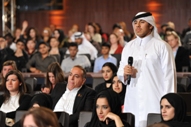
Thank you. I'm from Qatar. And I wanted to comment on the statistics. Because you have quoted Qatari statistics so much, I would like you to caution everyone against going with these statistics. In Qatar you would have to take statistics from the Statistical Authority. The statistics you quoted are not from there, so I caution against that. In Qatar, in our part of the world, we have maybe something unique: people would go into marriage but not consummate it. It's during this period of engagement. Legally it would be marriage, but it's not consummated. And in our region we have a lot of people - for instance, 50 percent who get into this engagement/ legal marriage sort of thing: they break it up before consummation. So this distorts the statistics of marriage. We know about this in Qatar, and this is one of the problems we're facing. So I would caution against going with interpreting the Qatari society based on the statistics you've quoted.
TIM SEBASTIAN
Where do you stand on the motion, if we can ask?
AUDIENCE (F)
I'm with the motion, but I would go with media campaigns to inform people, but I'm with the motion.
TIM SEBASTIAN
Media campaigns to discourage close family marriage?
AUDIENCE (F)
Yes. But no legal intervention. No legal intervention. Just we need to inform people, and we need to do a lot of work in this respect.
TIM SEBASTIAN
And is that likely to happen, do you think?
AUDIENCE (F)
Yes. Yes, I think so. And we need to bet on the educated younger generation to change this phenomenon in our part of the world.
TIM SEBASTIAN
Okay. Lady in the third row. Yes.
AUDIENCE (F)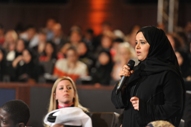
A couple of comments. We haven't even discussed the aspect of Islamic science. Islam, founded 1400 years ago, was already setting limits for, you know, this type of discussion. It's allowed in Islam, but it's not necessarily - that doesn't mean it's encouraged. There is that discouragement - you mentioned the hadith that ‘marriage from afar', it helps to make the society stronger and it helps to make the offspring stronger.
TIM SEBASTIAN
Excuse me, I think we'll get another microphone to you, because that one's playing up. I'm sorry. If you would start your question again. I'm sorry. Can you just tell us where you're from?
AUDIENCE (F)
I'm from America, and I've been living in Qatar for ten years. By the way, we're talking about the rate of divorce: it's actually more than 50 percent in America, and I don't think very many people over there marry their cousins. So I don't think that's a factor. When she was talking about the statistics, about the ones who don't consummate marriages, that that's actually included in the numbers - maybe they're a little bit skewed. Anyway, Islam actually addressed this a long time ago and was saying that it's actually allowed, but that is not the same as encouraged. It also sort of discouraged the idea of marrying cousins only from the aspect that, you know, marrying from afar will actually create stronger offspring. I think the ones that Mr. Ohad is talking about - you know, his community is a very, very small microcosm practically, and we're talking about inbred for generations; we're not talking about, you know, the occasional cousin who's marrying someone else. If you...
OHAD BIRK
It's 200,000, like the basic population of Qatar.
AUDIENCE (F)
200,000. Well, yes, but they've been inbred for generations. So you've got numbers that maybe they're double from two percent to four percent, but you're still talking about small.
OHAD BIRK
But the Pakistani community is also inbred for generations, and here it's also inbred for generations. That's exactly the problem.
AUDIENCE (F)
Well, so you're talking about..
OHAD BIRK
It's not the first first-cousin marriage.
AUDIENCE (F)
Yes, you're talking about encouraging those people to marry outside, which would be a good thing. But if you're talking about an occasional first-cousin marriage where the parents don't have any relation whatsoever, what's the harm in that?
TIM SEBASTIAN
Samar Fatany, do you want to say something?
SAMAR FATANY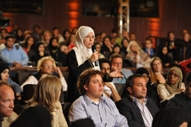
Thank you very much. I agree. Exactly - that's exactly what I was trying to explain. I mean, you cannot say that it's for sure going to happen. As, if there is a family that has been, as Manzoor had said, intermarrying for generations and they know that they have hereditary genetic diseases there, then it would be silly, of course. And with a bit of awareness and education, I don't think anybody would want to go through that kind of marriage.
TIM SEBASTIAN
Alan Bittles.
ALAN BITTLES
Well, mentioning the hadith of the Prophet Muhammed to marry at a distance, please recall also that the Prophet married his daughter to his first cousin. So in one way the Prophet was saying: "This is the advice that I give"; in another way you could take it: "Please follow my precepts."
AUDIENCE (F)
Again, it was allowed but not necessarily actively encouraged. He said it's allowed, demonstrated that it was allowed, but also turned around and said, you know, "It's a good thing socially and physically to marry outside of your tribe or your immediate community or your immediate family."
TIM SEBASTIAN
Okay. Lady in the second row there.
AUDIENCE (F)
Hi, I'm from UAE. My question is for the side that agrees with discouraging marriages between relatives. Do you think that by discouraging interfamily marriages, that could lead to an increased number of unmarried women? As we know, in the Gulf region the marriages between relatives are about 50 percent. So if you are encouraging that men should marry a woman from outside their family, or even from other countries, what would happen to the 50 percent of women who are from the country itself? They will remain unmarried. Thank you.
SARFRAZ MANZOOR
Why is it only the men that you're talking about there?
AUDIENCE (F)
Because they have like more options - they can go and like marry a woman from outside, and their kids will still have their passport, like they will be local from the Emirates. Whereas the women in the UAE, they want to marry Emirati men because they want their kids to be Emirati.
SARFRAZ MANZOOR
I mean, I can imagine that being initially a problem. Because if you have any kind of change, and if anything like this change happened, then I think there would be such problems. But in a way, I would say that that's possibly a price worth paying a bit further down the line: because actually, if those women are getting married in marriages which are potentially not going to be necessarily good for their children, maybe not necessarily ones that they actually wanted, maybe this is a battle you have to fight, and then eventually you win the war.
OHAD BIRK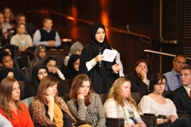
And I can tell you that we have educational programmes going for more than a decade, and we're seeing the change only in the last two or three years - and things work: people may get married, not within the very close family. That's why I'm saying not out of the family, so they marry within the family but further away. And...
TIM SEBASTIAN (to questioner)
You wanted to come back?
AUDIENCE (F)
Yes. But what about like from the 50 percent of the marriages between families? Maybe these marriages won't have like the negative effects on their kids, there won't be any disorder for their kids. Why do you discourage marriage if there won't be any future disease or disorders for their kids?
SARFRAZ MANZOOR
Are you saying if there's no dangers of there being any genetic...
AUDIENCE (F)
Yes, if there's no danger, why do you discourage?
SARFRAZ MANZOOR
Well, I'm not a geneticist, so in that sense I'll defer to you [looking to Ohad Birk] on that. I actually just think society is better - my question is more about society. I just think societies are better when people mix with wider communities than just their own family. That's my basic view, is I just think that even if the statistics thing, even if despite the health things, I just think it's better to get to know other families in other communities rather than just sort of stewing in your own pot.
TIM SEBASTIAN
Samar Fatany, you wanted to say something?
SAMAR FATANY
I think what she's trying to say is that in this part of the world people don't like to leave their homes or leave their country. They're kind of, you know, happy in their safe environment.
SARFRAZ MANZOOR
Is that because they're not allowed to?
SAMAR FATANY
Very few of Arabs emigrate to other countries. So...
TIM SEBASTIAN
But there are barriers for women leaving the country, aren't there.
SAMAR FATANY
No.
TIM SEBASTIAN
They need a male signature from Saudi Arabia, for a start, don't they?
SAMAR FATANY
Well, in the end she gets the signature. That is in her passport every five years.
TIM SEBASTIAN
Even an eighty-year-old woman has to have a signature of her male relative, doesn't she, to leave the country?
SAMAR FATANY
Not any more. Not any more.
TIM SEBASTIAN
Since when?
SAMAR FATANY
Since - well, now it's stipulated that you get the permission and you stick it to your passport, and you renew it with every, you know, passport renewal. So you don't have to get the permission every time you travel. It's in the system, within your passport.
TIM SEBASTIAN
Is that a big step forward?
SAMAR FATANY
Of course it is. [Audience laughter]
TIM SEBASTIAN
Okay, all right. Okay, lady in the third row there. Yes, you.
AUDIENCE (F)
I'm originally from Pakistan but was born in the US. My question is for the speakers speaking for this motion. You said earlier that marrying within families causes segregation in community and it affects society. If what you're saying should be implemented globally, since that's what seems equal and normal, shouldn't you think the Amish communities in the US should be discouraged from living the lives that they live, just because that segregates them from community?
SARFRAZ MANZOOR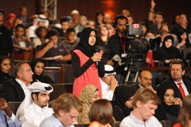
Possibly. I mean, I think the point about that really was just the fact that when you talk about social cohesion in a large country, there's a large - for example, in the States as well - there's a large Muslim community, predominantly from Pakistan, who are living in self-enclosed bubbles. That has problems of social cohesion for a wider society. Part of the reason for that is because they're marrying within each other, and therefore nobody's learning to speak English, etc. etc. Now, if there was a large - if there were two or three million Amish in Britain and they were doing exactly the same thing, I'd say absolutely that. I just don't think the problem of social cohesion in the Amish community is quite as dramatic as it is for the Muslim community.
OHAD BIRK
The Amish contributed a lot to knowledge in genetics and knowledge about genetic diseases. I don't think anyone wants to be one of these that contributed to studying his cases and his..
SARFRAZ MANZOOR
Where I live in London, there's a very large Hasidic community, and they pop out kids every year, and I think it's got pretty much the same questions there as well.
TIM SEBASTIAN
Okay. There's a lady up there who's had her hand up for a long time - she's actually supporting it with the other hand. Yes, you. Yes, if you'd like to stand up, we'll get a microphone to you.
AUDIENCE (F)
Hi. I'm from Pakistan. I'm married to a British Pakistani - he's not my first cousin. I think the gentlemen for the motion, especially the British Pakistani, you're confusing the issue with forced marriages, because that's the issue with the British Pakistani community there, as opposed to discouraging them to get married within their families. The other point I'd like to make is there are four people who are very, very close to me, four couples. They all have children with disabilities. Only one couple are actually related to each other; the other three aren't. So to me these statistics - it just seems like, you know, statistics are just floating around, and it can happen to anyone, really.
SARFRAZ MANZOOR
Can I just respond?
TIM SEBASTIAN
Yes, please.
SARFRAZ MANZOOR
Firstly, my name's Sarfraz. Secondly, you're talking about forced. I think the word ‘forced' is quite a blurry word when it comes to communities and families. So, for example, when I was 17 my dad suggested that it might be a good idea for me to marry my cousin, even though she lived in a village in Pakistan and had no idea of any of the films, books or music that I was interested in. There was no force, but there was a process where he didn't talk to me for quite a while. When I got to my early thirties, again it was suggested that it might be a nice idea for somebody from back in the village outside Lahore to marry. Again, it wasn't forced, but my mum told me she'd kill herself if I didn't. [Audience laughter] So there's still...
TIM SEBASTIAN
Just a little pressure.
SARFRAZ MANZOOR
There's a little bit of pressure. So I think the word ‘forced' - you know, it's a very flexible, elastic word.
ALAN BITTLES
Could I just ask: did your mother kill herself?
SARFRAZ MANZOOR
Luckily she didn't, but only.. Eventually what happened...
ALAN BITTLES
Well, then why raise the point?
SARFRAZ MANZOOR
Look, I'll tell you why...
ALAN BITTLES
I mean, it gets a ready laugh, but come on, let's relax on this one.
SARFRAZ MANZOOR
No, excuse me. Look, I'll tell you why. I'll tell you.
ALAN BITTLES
Really? You're too much the joker. [Audience applause] This is a serious subject. Let's treat it with respect.
SARFRAZ MANZOOR
If I'm a joker, I think you're a bit of an actor, so, you know. [Audience laughter, applause]
TIM SEBASTIAN
Let's go back to the questioner.
AUDIENCE (F)
Just very quickly, I think that that amounts to emotional blackmail, which actually is in effect, you know, forcing you to make a decision, a life decision. So that is the issue within the British Pakistani communities: not so much that we need to discourage them. Because I don't think - I'm not in favour of cousin marriages, but I don't think it's up to any one of us to tell others what to do. They need to make informed decisions.
OHAD BIRK
‘Informed' decisions.' Right.
TIM SEBASTIAN (to questioner)
So you wouldn't recommend that people don't drink to excess, you wouldn't recommend that people don't smoke, you wouldn't recommend anything like that?
AUDIENCE (F)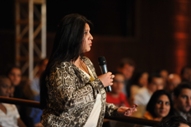
No, it's basically people have that information, and then they choose what they want to do with their life. If they want to destroy themselves, that's fine. If they don't, then - you know. But you can't force people not to marry within families. In Pakistan it's a common practice, within educated classes as well. I don't know of anybody who has children with disabilities. As I said, there are four couples I know: only three of them are actually not even related and they have disabled children. So these to me are just statistics. It can happen to anyone.
TIM SEBASTIAN
Okay. Gentleman in the front row.
AUDIENCE (M)
I'm from Egypt, and my question is - well, I'm going to start with a little preface to the question. I think at this point the entire debate boiled down to that both sides agree: there's no dispute against the science that marrying your first cousin will increase your chances of disease. But that's not the issue at hand any more. The issue at hand is that term ‘discourage'. ‘Discourage' is a very strong word and it implies taking action against something. So, for example, if I want to discourage my son from smoking, I'm not going to give him pocket money. That's discouragement: it implies taking action. And the question that we should be asking now, or the question I'm going to ask the panel to focus more on, is: what are the parameters of this discouragement? What is discouragement? Some suggested using media campaigns, some suggested simply informing people. But where do you draw the line where discouragement becomes infringement upon people's freedoms?
OHAD BIRK
Okay, the basic idea is complete free choice. No doubt, I think, in anyone on the panel that that should be the limit. Okay, complete free choice. Having people know their choices - what's for, what's against - and make their choices. But people need to know. And then it's up to them.
AUDIENCE (M)
So it's not discouraging. I'll use the same term that Tim Sebastian used: it's ‘recommend' that you don't marry your first cousin, but you wouldn't go as far as discourage it - whatever ‘discourage' means.
OHAD BIRK
"Whatever ‘discourage' means."
TIM SEBASTIAN
Do you think it should be discouraged? Where do you stand on this?
AUDIENCE (M)
In my opinion, I think people should know that there is a chance of increased disease - as you all agree, as all four - or five, even - of you agree. But I can't tell someone I don't think it will be a good idea; I'll just tell them, you know, "There is that risk, and it's completely up to you."
OHAD BIRK
By the way, the only people I know that really strongly discourage are parents of very sick kids that have in their families all these disasters. And they are the ones that talked to me before I came here and said, you know, "You fight the battle for us." So yes, these are the ones that will discourage, all others will inform.
AUDIENCE (M)
You see, using words like ‘fight a battle' makes it sound like there's a lot of force involved.
OHAD BIRK
For them, yes. For the others, get the information. If you want to be the next one in line, or maybe have a very significantly higher risk, take your risk. Fine.
TIM SEBASTIAN
Alan Bittles.
ALAN BITTLES
I agree very strongly with what you say, and this was the point I was trying to raise originally. Once you start a process of ‘discouragement' (in parenthesis), where does it end? And especially in a society or in societies where there isn't the requisite scientific personnel or medical personnel or genetic counsellors to actually provide information in a dispassionate and unbiased manner, then you are going to have difficulties. Something is going to go wrong with the system, and once the system is in play it can really go out of kilter very, very seriously.
AUDIENCE (M)
I couldn't agree more with Dr. Bittles.
TIM SEBASTIAN
You'd discourage smoking, though? Discourage unsafe sex?
AUDIENCE (M)
There are campaigns against smoking, but I can't go on to..
TIM SEBASTIAN
That's official discouragement.
AUDIENCE (M)
No, that's informing people, like many of you suggested, that studies have been made and smoking can cause cancer, but I can't go breathe down somebody's neck and say, "You can't smoke, and I discourage you from it."
TIM SEBASTIAN
Not "can't" but "maybe you shouldn't". Isn't that the basis of these campaigns: "You shouldn't smoke. You shouldn't drink to excess. You shouldn't eat too much."
AUDIENCE (M)
Maybe people should have the choice to make that decision for themselves. There's a much higher chance of you dying going dirt-biking or dune-ing in the desert. But you can't go telling people, "You can't do these sports" because there's a higher chance that they're going to harm themselves. They know the risks, they know what's the risk at hand, but in the end it's their choice. There has to be freedom. This discouragement is very crucial and very central, because at some point I'm afraid people will confuse discouragement with forcing people not to have their choice.
OHAD BIRK
In clinical genetics terms, discouraging is informing and it leaves totally free choice for everyone. That's the way we...
TIM SEBASTIAN (to questioner)
And you don't think where a society has to pick up the health bills from drinking and smoking and things like that, that it has a right to discourage? When the public has to pay the health bills, doesn't it have a right to discourage these harmful practices?
AUDIENCE (M)
That's why we have voting polls: people choose what can be discouragement, where you can draw legal barriers and where you can't.
TIM SEBASTIAN
Alan Bittles, you want to comment on that?
ALAN BITTLES
Again, we're obviously at one on this. We have experience in the past, sadly, of genetic campaigns that were initiated with good aims in mind to reduce the level of intellectual disability, to reduce genetic diseases - they went disastrously wrong, with people compulsorily sterilised. And these actual campaigns went on until the 1960s and 1970s in countries like Canada and in Sweden and in Finland.
TIM SEBASTIAN
Well, Ohad Birk, won't you discuss that point for a moment?
OHAD BIRK
Yes. I am very clear, and so is every person doing clinical medicine anywhere in the world: there is no legal way of doing things, there is no forcing of anyone into anything. Informing people and having them have their full free choice. And I think this is what we see as encouraging.
AUDIENCE (M)
May I quickly come to closing remarks about this, real quick?
SARFRAZ MANZOOR
You're going to come to closing remarks?
TIM SEBASTIAN
You're going to close? We're all going to come to closing. I want to take another question. Thank you. Gentleman up there. Yes.
AUDIENCE (M)
Yes, hello, everybody. I am French and Lebanese. Now, my question is for the proposition team. Now, do you believe that discouraging same-family marriage will be a step towards modernity?
TIM SEBASTIAN
"Discouraging same-family marriage will be a step towards modernity." Sarfraz Manzoor.
SARFRAZ MANZOOR
Good question. I would say it would be a step toward progress, yes. And I think possibly the kind of progress that may not necessarily be what the governments want, as well.
AUDIENCE (M)
What do you mean by not the governments want?
SARFRAZ MANZOOR
Well, I just think that if you start thinking that you can do things which aren't what historically years of tradition have suggested, there might be other things that have been going on for years of tradition which you might want to challenge as well. So I think on the whole, yes, I think that it is a radical step, it's a progressive step, but I also agree that you can't legislate it - it has to be about information and it has to be through choice. And there also has to be support for people who want to do it not to feel that they are being ostracised or ignored or left behind.
OHAD BIRK
What you think of as modern and good is not necessarily what others think. People have the right to have their own culture, to grow within their culture, to keep their culture, which is perfectly fine. That's why I am promoting marriages within the larger family: keeping in the community and keeping away from the dangers of medical diseases, through marrying a bit further away.
TIM SEBASTIAN
Alan Bittles.
ALAN BITTLES
In political terms, I would suggest that it could well be argued that reducing consanguineous marriage actually strengthens central government. That consanguineous marriage and marriage within clans and tribes actually removes power from the centre and devolves it to smaller groupings. So I would take an opposite viewpoint and say that actually by reducing consanguineous marriage you're likely to strengthen central government and the diktat of central government.
TIM SEBASTIAN
Okay. We're going to go in a moment to the vote. But before we do, I'd like to just ask each of the panellists for one sentence crystallising their views. And we're going to go round in a semi-circle, and start with you, Sarfraz. Just one sentence.
SARFRAZ MANZOOR
Just in a sentence: you can't force people, but you can encourage them. And because I believe in human rights, freedom and a better, more integrated and happier society where it's the individual that matters and not the family, I think we should support the motion.
TIM SEBASTIAN
Ohad Birk.
OHAD BIRK
Well, marry within your community. Keep your culture. Do genetic testing - it's important. But do not marry your first cousin. And I see the suffering in families daily - it's much too much.
TIM SEBASTIAN
Okay. Alan Bittles.
ALAN BITTLES
Humans have been marrying first cousins and even closer for literally thousands of years. We started with 700 to 10,000 people living in Africa; we now number 5.8 billion. If cousin marriage/cousin mating had been all that problematic, we wouldn't be here today.
TIM SEBASTIAN
Samar Fatany.
SAMAR FATANY
I believe that awareness campaigns and education can help this problem. And once people are aware that there is a problem, it will not be a problem anymore.
Vote result
TIM SEBASTIAN
Okay. Ladies and gentlemen, we are now going to vote on the motion: ‘This House believes marriage between close family members should be discouraged.' If you would just take your voting machines, I'll explain to you how they work. If you want to vote for the motion - that is the side represented by those on my right - in a moment you're going to need to press button 1. If you want to vote against the motion - the side represented by those on my left - it will be button 2. Whichever button you want to press, please do it now. You only have to press once, and we should have the result for you in about 15 seconds.
Okay, there we are. [Audience applause] That's the result: 81 percent for the motion, 19 percent against. The motion has been resoundingly carried. All that it remains for me to do is to thank our distinguished panellists. Thank you very much for being here tonight. Thank you to you, the audience. The Doha Debates will be back again in a month's time. Till then, from all of us on the team, have a safe journey home. Thanks for coming. Good night. Thank you. Thank you. [Audience applause]
Watch online
 Pre-debate voxpops
Pre-debate voxpops The debate
The debate Highlights
Highlights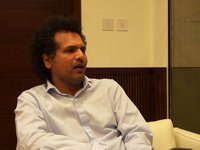 What the speakers had to say
What the speakers had to say Your reaction to the debate
Your reaction to the debate Debate wrap
Debate wrap
